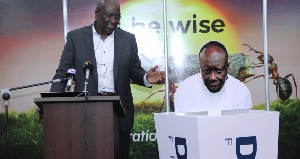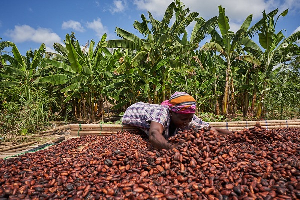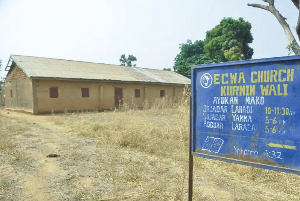Mr Kenneth Thompson, who has been advocating the devaluation of Ghana's currency, has renewed his call, saying it is the best option for a government keen on raising revenue to plug holes created over years of living beyond its means.
“Let’s devalue the currency….we don’t have a choice,” the Chief Executive Officer (CEO) of Dalex Finance said in an interview monitored on Accra-based Joy FM.
A currency devalues when its value declines in relation to one or more other currencies.
For Mr Thompson, devaluation makes sense since government is faced with a situation where it has to pay its debts either by imposing more taxes or by massive cuts in expenditure including public salaries.
He said governments over the past 25 years have been overspending. When Ghana found oil in commercial quantities, “the party started,” leading to a huge margin of spending more than government earned and building up unsustainable deficits, he stressed.
Government now expends over 83 per cent of its revenues on salaries, statutory and interests payments, leaving very little for development unless it borrows more which will have to be paid back partly through more taxes.
In effect, “the party is over”, “we have to dig ourselves out of the hole,” he maintained.
Ghanaians have begun the new year with fresh increases in petroleum products between 18 and 28 percent with predictable public outcry.
Government is also backtracking on a 1 per cent tax on interest earned by individual on their investments.
Criticizing the rationale behind the tax on investments earnings, Mr Thompson said government is overtaxing the same bracket of tax-paying Ghanaians.
He described it as “killing the goose that lays the golden egg”.
For him, government may have tested the waters by floating the idea to gather public reaction.
“Somebody just floated it…because it just doesn’t add up,” Mr Thompson criticized.
Suggesting an approach to a cash-strapped regime, the Dalex Boss says devaluing the currency is the way to go.
Mr Thompson is convinced Ghana Cedi is overvalued. He used the Big Mac Index to explain that if a dozen eggs cost $4, then GH¢4 should equally buy a dozen in Ghana.
According to him, GH¢4 cannot buy a dozen eggs as a crate costs GH¢17. Ken Thompson wants government to “allow the currency to reach its true value”.
“The longer we postpone the decision, the more painful it will become; if Ghana does not devalue its currency, in the long run, the exchange rate will,” he pointed out.
He said “the only people who benefit from overvalued currency are the elites” because they have dollars enough to import or buy imported goods and luxury items. A devalued currency means Ghanaians will use more cedis to buy the same basket of goods.
Admitting the painful circumstances arising from devaluation, the CEO said as much as it hurts, it is Ghana’s best way out of its nagging financial troubles.
The upside is that Ghanaians will have a financial incentive to produce for export.
He said in previous periods when Ghana’s currency was devalued, professionals including teachers went into cocoa production because export became very attractive.
Ken Thompson wondered why a staple food like maize should experience low production in Ghana and expressed confidence that under a devalued regime, maize production will shoot up.
“I can assure you, maize producers will start producing more.”
According to him, the campaign to buy and export Made-in-Ghana goods stands to receive a great boost if government takes a painful but appropriate decision to devalue the currency.
Business News of Friday, 8 January 2016
Source: thefinderonline.com













